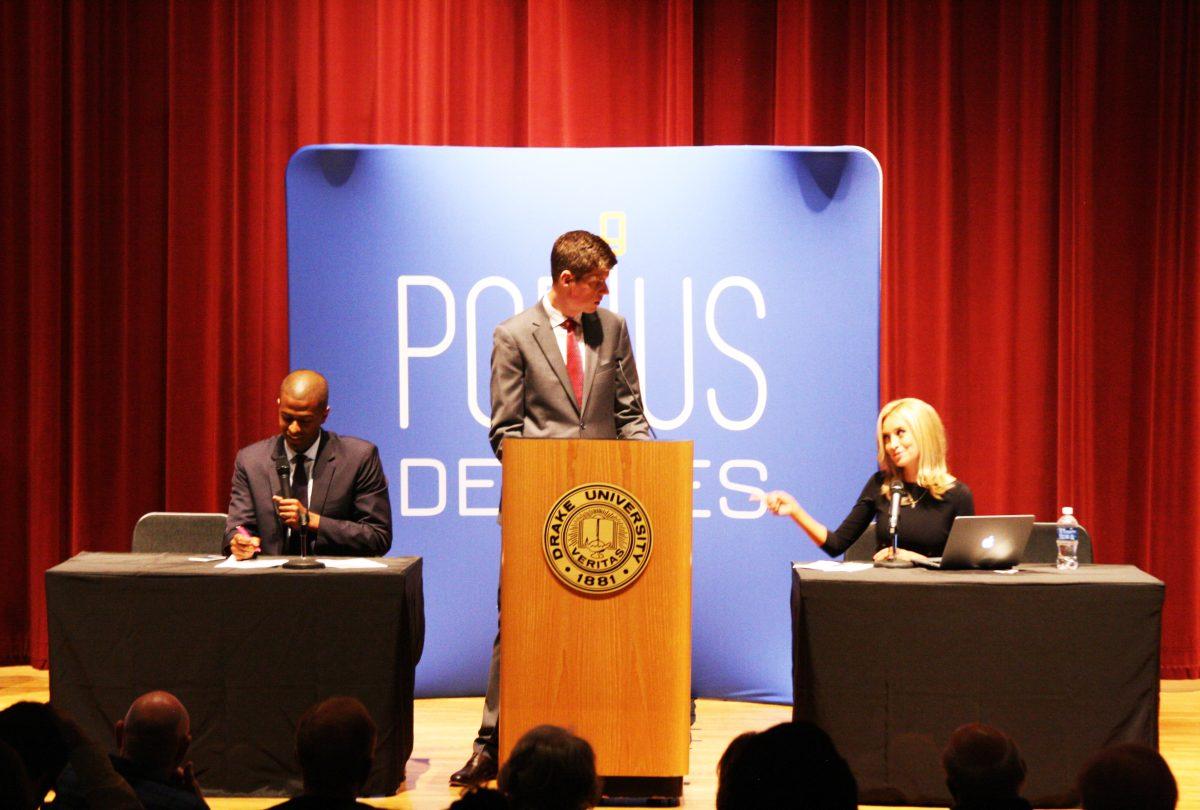PHOT AND STORY BY LÓRIEN MACENULTY
The National Speech and Debate Association brought the Podius Debates to Drake University on April 25.
CNN commentators Bakari Sellers and Kahleigh McEnany reflected on the morality of civil disobedience as a means of political progression. Iowa Public Radio’s Clay Masters moderated the discussion.
They discussed whether or not the active refusal to obey certain laws is a violation of the democratic process or if it is a constructive effort that can keep the government in check.
Sellers argued that civil disobedience is morally justified in achieving societal progress.
Before the debate began, a simple poll revealed that 62 percent of those in the audience who voted sided with Sellers. The poll revealed that 14 percent of voting audience
members side with the argument that civil disobedience is not morally justified.
McEnany represented these individuals in the debate by asserting that the justification of minor felonies is spawning grounds for more violent expressions of discontent.
“The stakes are too high,” McEnany said. “Let’s not let the nefarious, those who want to engage in wrongdoing, operate under the cover of civil disobedience.”
Sellers and McEnany disagreed on the fundamental definition of the phrase in question.
“Civil disobedience is not a protest that is not peaceful,”
Sellers said. “Civil disobedience is not looting. Civil disobedience is not rioting. So what civil disobedience is is the refusal to obey certain laws that government demands as a peaceful form of political protest.”
McEnany’s rebuttal incorporated the original definition of the term as coined by Henry David Thoreau in 1848, which interpretively may have incorporated less peaceable means of protest.
“That is a society that does not have respect for the laws, justifying it, saying that civil disobedience is ok. If you don’t like the law, protest it,” McEnany said. “We are not at a point in our society where we are ready for that kind of broad rule of, ‘You can do what you please if you don’t like the law.’”
Sellers, whose family members have ties with acts of civil disobedience, said that this form of activism strives to make the populace and the government aware of neglected grievances.
“It is meant to make you pause,” Sellers said. “It is meant to make you wake up. That is the purpose of civil disobedience. So, yes, we will block your streets. Yes, we will make it difficult for you to get to the mall, make it difficult to get to work.”
Frequently addressed subjects in the discourse extended to the protection of freedom of speech as written in the First Amendment and the effectiveness of civil disobedience during the Civil Rights Movement. The debaters also cited numerous cases of civil disobedience in today’s society, notably Kim Davis in her 2015 refusal to issue a marriage license to a gay couple, among others.
Another poll concluded the event. By the end of the debate, 77 percent of respondents said that saying the civil disobedience is morally justified and 23 percent arguing that it is not.
“I thought the two participants were outstanding,” said Ray Seidelman, an attendee of the event. “I thought they were well prepared, good arguments. And I was impressed.”
Mikhail Koha, a junior Drake student studying political science, said that McEnany made several good points.
“But I think when you define it as protest, when you define it as not being violent towards people in any way, a peaceful protest, then civil disobedience is needed and completely necessary,” Koha said.
Drake now serves as the home of Podius Debates, a series dedicated to encouraging civil discourse and open dialogue at academic institutions.







